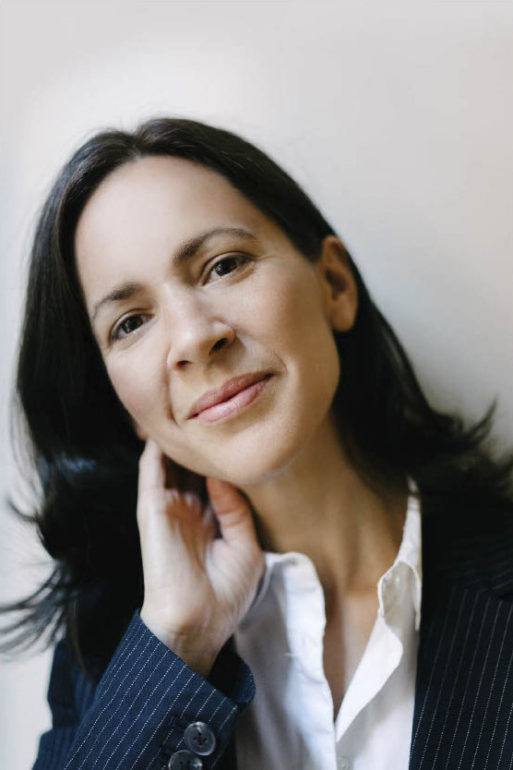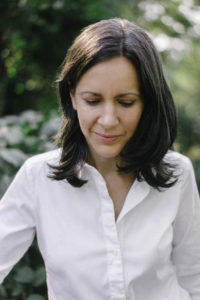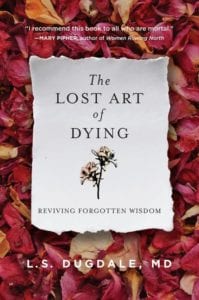 In her book “The Lost Art of Dying,” bioethicist Dr. Lydia Dugdale explores the ways in which humans have prepared for death throughout history, and how we might apply that wisdom to the end-of-life experience today. Dugdale is a practicing internist as well as an associate professor of medicine at Columbia University, and she directs Columbia’s Center for Clinical Medical Ethics. She is also the editor of “Dying in the Twenty-First Century,” a collection of essays on end of life by medical doctors, theologians and philosophers.
In her book “The Lost Art of Dying,” bioethicist Dr. Lydia Dugdale explores the ways in which humans have prepared for death throughout history, and how we might apply that wisdom to the end-of-life experience today. Dugdale is a practicing internist as well as an associate professor of medicine at Columbia University, and she directs Columbia’s Center for Clinical Medical Ethics. She is also the editor of “Dying in the Twenty-First Century,” a collection of essays on end of life by medical doctors, theologians and philosophers.
Though she didn’t always know she’d go into bioethics, Dugdale has been interested in moral questions since she was a child. The question of how to live a good life led her to the question of how to die a good death — a quandary that too many of us ignore until we reach the end of life. Dugdale’s interest in helping people eventually led her to medical school, where she discovered the field of bioethics. It was the perfect fit: moral questions within the context of medicine.
Dugdale spoke with SevenPonds about her new book, the human relationship with end of life throughout history and the importance of “living into death.”
Thank you so much for taking the time to speak with us today, Dr. Dugdale. I’d like to start by exploring the concept of a “good death.” It’s a phrase that comes up a lot in bioethics, but it can feel a little abstract — in your experience, what does it actually mean to die a good death?
In both of my books, I draw from the idea of the “Ars moriendi,” which is Latin for “the art of dying.” It’s a body of literature that developed during the aftermath of the bubonic plague in the early 15th century.
In the aftermath, the survivors petitioned the social authorities for guidance on how to prepare for death. They knew that either the plague would come back or there would be famine or war. Life was precarious at that time. There was no sense that death was just an option — it was an inevitability.
The church issued the first iteration of “Ars moriendi,” and it was a sort of handbook on the art of dying. There were many iterations after that. Some were religious, others were not. But the underlying theme was always that one needed to attend to living well to die well.
That meant thinking about what kind of character or habits you wanted to cultivate. Were you a person of integrity, of honesty, of solidarity? Did you invest in your community? Then there were the more existential questions: Why are we here? What is this life for? The idea was to think about these things in the context of your community so that you would cultivate a sense of peace throughout life, instead of arriving at the end in spiritual or existential distress.
I think if you boil down this 500 years of “Ars moriendi” literature to just a couple of things, it’s this acknowledgment of human finitude, and its implications on how we live, how we relate to our communities and how we wrestle with those questions within the context of our communities.
 You’ve also talked about this mentality we have that the ultimate goal is always to live longer, at any cost — that whatever measures we can take to extend someone’s life, we should take them. Can you talk about why this mentality might be problematic in some cases?
You’ve also talked about this mentality we have that the ultimate goal is always to live longer, at any cost — that whatever measures we can take to extend someone’s life, we should take them. Can you talk about why this mentality might be problematic in some cases?
As any doctor or doctor-in-training will tell you, we care for many, many patients who end up lingering in the intensive care unit. From some of these patients’ perspectives, they are living a life worse than death. In some ways, the things that medicine has made possible can bring more suffering than death itself.
Partly that’s because death ends that suffering, in a sense. But it’s also the emotional toll that it takes on the patient’s care team — doctors, nurses, social workers, and so on — who are providing around-the-clock care for patients who are actively dying.
I’m not talking about the sort of case where there’s a possibility of return to what the patient would call a meaningful life — like when Grandpa comes in with bad pneumonia and goes on life support until he can get better. Rather, it’s the cases where the patient is actively dying, and yet we are still throwing the fullness of medical technology at that patient in order to delay death just a little bit longer.
This is problematic for many reasons. It causes enormous suffering for the caregivers. It also uses an incredible amount of resources that — in some cases, anyway — could be put to better use. I think probably the biggest reason it feels problematic is that it’s a bit of a charade. And it is a charade with a huge emotional and financial cost.
You mentioned that the “Ars moriendi” originated in the 1400s. Do you think there was a time in history where we had a more realistic or open relationship with death and dying, or is that something we’ve always struggled with?
My very general impression is that most cultures have dealt with death by necessity for most of history until relatively recently. In fact, in 1873, the U.S. had fewer than 200 hospitals. By 1910, we had more than 4,000, and by 1920 more than 6,000, which is slightly greater than what we have today.
When you go from 200 hospitals in a country to 6,000, it means that no one has to do the work of caring for the dying. I’m not just talking about outsourcing that care, which has largely fallen on women in the past, affecting women’s careers and opportunities. It’s also about the promise of modern medicine. We developed antibiotics in the 1920s, early chemotherapy in the 1940s, organ transplants and CPR in the 50s and 60s, and combo chemotherapy in the 70s. Anyone who’s a baby boomer or younger has never seen the kind of death that we’ve lived through in the last year.

Dr. Dugdale’s book “The Lost Art of Dying”
In fact, there is this sense that death is pretty much optional, or that we can delay it for a very long time. But that mentality is really only about 100 years old. For most of history, most cultures have just dealt with death.
The early iterations of the “Ars moriendi” described what they thought were the five temptations faced by the dying — five things that might keep people from dying well. These were doubt, impatience, pride, greed and despair. What it didn’t include was the temptation of fear. The fear of death was never featured.
In those days, you just had to face death. It was part of life; it was a reality. You walked straight toward it. In my book, I talk about “living into death.” I think that’s what they did very well for most of time.
Do you believe the COVID-19 pandemic has changed the way we think or talk about death?
I think it hasn’t changed enough. The pandemic has provided this incredible opportunity for us to acknowledge our finiteness, to say that yes, death is certain, mortality has always been 100%, and now it’s staring us in the face. But if you look at what the dominant language has been — in the press, in social media, in medical journals — everything has been about cures, vaccines, treatments. To borrow from Susan Sontag’s “Illness as Metaphor,” we’ve appropriated military language to talk about “fighting” disease, “conquering” death, “kicking” this illness. The language we use is very violent, but the fact remains that mortality is 100%.
How often do you read in the newspaper or hear on the news, “Hey, maybe we need to stop and think about our mortality”? That hasn’t been in the public conversation very much at all. I’m disappointed that it’s been addressed so little.
I finished my book manuscript more than a year before COVID. I wrote about these themes of the plague and the need to prepare well for death, but I never thought that the book would be released in the midst of a pandemic. It’s difficult not to relate to the moment of being in a pandemic when my work for the last decade or more has really focused on how the prospect of death should get us to think about how we live and how we want to die.
There seems to be a theme of community and solidarity when you talk about dying well. Can you explain this further?
Sometimes people will tell me, “I’m a loner, I don’t have a big network. If I think about who’s going to be there when I die, I can only think of one or two people.” My response to that is we don’t need to revert to the model of the late Middle Ages, where the entire parish would parade past the deathbed. Nobody wants an anonymous throng — but if you have one or two good friends or family members or neighbors, people who have your back and are willing to be with you until the end, that’s community.
Somebody said to me once, “I know who I want to be at my death bed, but frankly, I really can’t stand him. We’re not in a good place right now. Can I just wait until the end to try to reconcile with this person?” Of course, my response was, “Who knows when the end is?”
We have this idea we’re going to die when we’re old, but I think if the coronavirus has shown us anything, it’s that there’s no guarantee. What’s more, if we invest in those relationships that matter to us now, then not only will our living be richer, but our dying will as well.

 What Does It Mean to Die Well?
What Does It Mean to Die Well?




 Are “Rage Rooms” a Healthy Outlet for Grief and Burnout?
Are “Rage Rooms” a Healthy Outlet for Grief and Burnout?















I’m a caregiver to my adult son, a pediatric medulloblastoma/radiation, then a stroke at age 29. The follow up clinic has turned their backs on him. No medical team seems interested in helping us, living in medical poverty because of the malpractice from Yale…I’m numb, and alone. I dont have a community to lean on for support. I dont have the funds to learn how to help him die with dignity.
Report this comment
Hi Sandra,
I’m so sorry to hear about your son and your situation. It sounds like you’ve been through a lot and now have been left to cope with the aftermath alone.
You don’t mention where you’re located, but you might be able to find some assistance at the Zen Caregiving Project (formerly Zen Hospice.) They are located in the San Francisco Bay Area, but offer many services online. They also offer classes for family caregivers that include mindfulness training, which might be very helpful in learning to cope with the enormous stresses of caring for your son. I just looked at their website, and they are currently offering a caregiver course for free (it’s usually $100) if you enroll in a study, which seems like it will just involve filling out some surveys as the course progresses. Here is a link to that page. https://zencaregiving.org/caregiver-study/
I hope this proves to be a good resource for you — the organization has done wonderful things for the dying through the years. If it doesn’t work out, perhaps you could reach out to a local hospice and see if they can refer you to a support group? Many of them meet online so you wouldn’t have to leave your son to attend.
I wish you the best of luck.
Report this comment